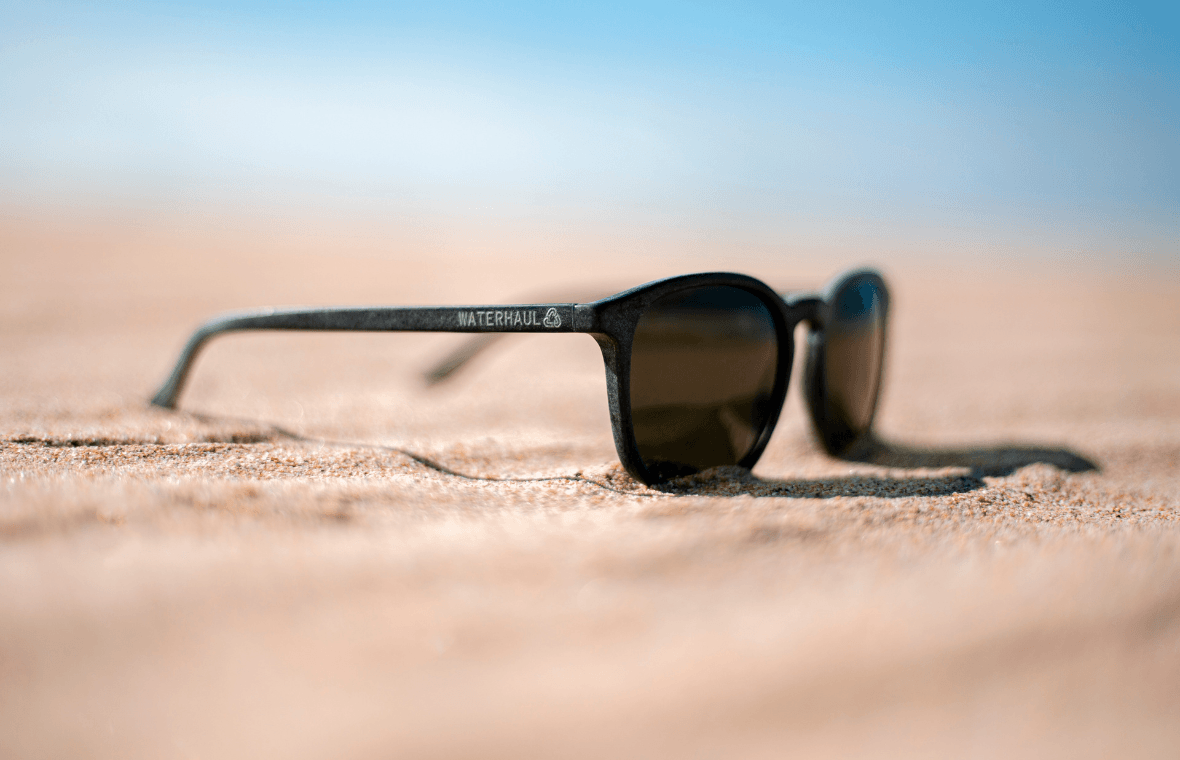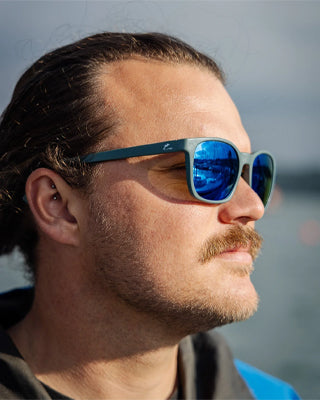UV PROTECTION EXPLAINED!
If you’ve been looking for a new pair of sunglasses recently, you will have noticed that many sunglasses and eyewear manufacturers claim to offer ‘UV’ Protection, but what does this mean?
UV protection is one of the most important factors to consider when purchasing a new pair of designer sunglasses, so let us break down what UV is, and why it’s important to protect your eyes from it!
WHAT DOES 'UV' MEAN?

Ultraviolet radiation travels in rays from the sun.
Ultraviolet, or UV, is a type of radiation that comes from the sun’s nuclear reactions, as well as artificial sources, including tanning beds, black lights and lasers, that travel in three types of rays; UVA, UVB and UVC.
It is invisible to the human eye and falls within the range of the electromagnetic spectrum between visible light and X-rays.
Exposure to UV radiation can have various effects on human health. While moderate exposure to UV rays is beneficial for the production of vitamin D, excessive exposure can lead to skin damage, eye damage (such as cataracts), and an increased risk of skin cancer. Therefore, it's important to take protective measures, such as wearing sunscreen, sunglasses, and protective clothing, to minimize the harmful effects of UV radiation.
WHAT'S THE DIFFERENCE BETWEEN UVA AND UVB RADIATION?

Ultraviolet radiation travels to Earth in UVA, UVB and UVC rays.
UVA rays make up 95% of the ultraviolet light that reaches Earth from our Sun, thanks to the way they travel in long, high-energy waves, with much greater penetration power than UVB rays. These waves travel straight through our atmosphere and even cloud cover, reaching deep into the layers of our skin. These rays then cause damage to the cells genetic material and degrade the skin’s collagen and elastin, causing it to age and wrinkle early. UVA is the main type of light used in tanning beds, thanks to the way it quickly causes your skin to tan.
UVB waves make up around 5% of Ultraviolet radiation that reaches Earth, which travels in much shorter, lower-energy waves that damage the outermost layers of our skin. These waves don’t penetrate windows and are more likely to be filtered out by clouds. UVB waves are responsible for most skin cancers, as well as causing a delayed sunburn, which usually appears a few hours after exposure to the sun.
In short, UVA ages your skin, while UVB burns it! Think A for 'ages', B for 'burns'!
WHAT ARE UVC RAYS?
The Sun also emits UVC rays, which have the shortest wavelengths and the highest energy levels out of the 3 types of UV rays, which can cause severe damage to your skin and eyes, including burns, lesions and ulcers. Thankfully these harmful rays are completely filtered out by the ozone layer in our atmosphere, however, there are some artificial sources of UVC, like welding torches, bacteria-killing lightbulbs, and mercury lamps.
IS UV RADIATION BAD FOR EYES?

Protecting your eyes from sunlight is just as important as protecting your skin.
We are all well aware of ways to protect our skin from getting burnt in the sun; covering up, wearing suncream etc, but our eyes are actually 10 times more sensitive to UV light than our skin!
UV radiation can cause both long-term and short-term damage to our eyes. The surface of our eyes, as well as our corneas and lenses, are all at risk of being burnt like our skin, but long-term exposure to UV radiation can be even more serious.
Prolonged exposure to UV rays can permanently damage your eyes and make them more likely to get cataracts; a gradual clouding of the eye lens which leads to blurry vision, or even a gradual loss of vision in the centre of your eye (macular degeneration). These risks are why it is so important that you ensure your sunglasses have proper UV protection.
Children’s eyes are even more susceptible to UV damage, as they have larger pupils and clearer lenses, meaning up to 70% more UV light can reach their retinas!
WHEN AM I AT RISK OF UV EXPOSURE?
There are lots of different factors that can affect how powerful UV rays are, including:
- Time of Day – Between 10 am and 4 pm when the sun is at its highest in the sky, the sun’s rays have less distance to cover, making them more powerful.
- Season – Sun exposure is at its highest during Spring and Summer, however, you should still take precautions against the sun in Autumn and Winter.
- Cloud Cover – Clouds can filter some UV rays from reaching the ground, particularly darker rainclouds filled with water.
- Reflective surfaces – UV Rays reflect off of most surfaces, including water, snow, pavements and roads. Surfers are at particular risk to this, as the ocean's surface is reflecting additional rays into your eyes whilst you're scanning the horizon for waves.
UV PROTECTING SUNGLASSES

Waterhaul sunglasses offer UVA / UVB 400 protection; the highest level of UV protection possible.
When it comes to protecting our eyes from the sunlight, many people gravitate towards ‘polarising’ sunglasses, which only reduce the glare being reflected into your eyes. Polarising lenses alone do not protect your eyes from UV rays, so instead, you first need to look out for sunglasses that specifically offer UV protection.
The highest level of UV protection in eyewear is UVA/UVB 400, which provides your eyes with nearly 100% protection from UV rays. You can also combine UV 400 protection with polarised lenses; a perfect combination for those who spend lots of time by the sea or snow!
When selecting a pair of UV sunglasses, there are several key factors to consider to ensure maximum protection and comfort:
UV Protection: Look for sunglasses that offer 100% protection against both UVA and UVB rays. Labels should indicate "UV400" or "100% UV protection," ensuring they block wavelengths up to 400 nanometers.
Lens Quality: Choose lenses that reduce glare and enhance clarity. Polarized lenses are especially good for reducing glare from reflective surfaces like water and snow, improving visibility and comfort. Waterhaul's most popular pair with polarized lenses, are the Waterhaul Kynance Navy polarized sunglasses
Lens Tint: The colour and darkness of the lens can affect your vision. While darker lenses don’t necessarily offer more UV protection, they can be useful in very bright conditions. Gray lenses provide true colour perception, the best example of these sunglasses are the Waterhaul Fitzroy eco friendly sunglasses, which offer polarised lenses and , brown/amber lenses enhance contrast, and yellow lenses are good for low-light conditions. Blue mirror lenses, such as the ones on the Waterhaul Pentire Unisex sunglasses offer a range of benefits that make them ideal for various outdoor activities. They maintain true color perception, allowing you to see your environment in its natural hues without distortion. The mirror coating significantly reduces glare from reflective surfaces like water, snow, and sand, enhancing contrast and visual clarity. By filtering out specific wavelengths of light, blue mirror lenses improve detail visibility and reduce eye strain, ensuring comfort during prolonged use. Additionally, they provide 100% protection against harmful UVA and UVB rays, safeguarding your eyes from ultraviolet radiation. Versatile and effective in different lighting conditions, blue mirror lenses are a great choice for anyone seeking enhanced vision and eye protection outdoors.
Lens Material: A lot of poor quality sunglasses use plastic lenses such as polycarbonate. This cheap plastic, can take a very long time to decompose naturally in the environment. Estimates vary, but it generally takes several hundred years for polycarbonate to break down completely due to its durable and stable chemical structure. Recycling polycarbonate lenses is more practical than waiting for them to decompose. However, the recycling process for polycarbonate is not as straightforward as for some other plastics. It requires specific facilities that can handle the material, breaking it down into its base components for reuse. Even with recycling, the process involves energy and resources, making it important to reduce, reuse, and recycle thoughtfully. The best quality lenses available are mineral glass lenses. Mineral glass lenses are a great choice for sports sunglasses due to their exceptional optical clarity, providing sharp and clear vision that can enhance performance in precision sports. Their high scratch resistance ensures they remain clear and effective over time, even in challenging environments. Additionally, their durability against scratches means they maintain their visual performance, making them a reliable option for athletes who need consistent and long-lasting eyewear. especially if you'll be using the sunglasses for sports or outdoor activities.
Frame Fit and Comfort: Ensure the sunglasses fit well and are comfortable to wear for extended periods. Look for secure, but not too tight, temple arms. Wraparound styles provide additional protection by blocking UV rays from the sides. The Waterhaul Zennor sunglasses are the best sunglasses for sports and adventurers to enjoy earing for this reason.
Durability: Check the build quality of the sunglasses. Frames should be sturdy and made from durable materials like recycled plastic, metal, or acetate. Scratch-resistant and anti-reflective coatings on the lenses add to their longevity.
Style: While protection is the priority, you'll also want a pair that suits your personal style. There are many fashionable options available that don't compromise on UV protection. Be aware when looking for sunglasses, most poor quality sunglasses that have plastic lenses, will also see their UV coating dramatically drop over time, resulting in needing a new pair of sunglasses every 2-3 years. All Waterhaul sunglasses come with mineral glass lenses, which do not have this issue. It is one of the reasons Waterhaul is proud to offer a lifetime warranty on all our sunglasses.
Brand Reputation: Consider purchasing from reputable brands known for quality eyewear and UV protection. Established brands often have rigorous testing standards. With brands like Ray ban sunglasses, Oakleys and Waterhaul leading the way for both sunglasses and prescription or RX sunglasses. All Waterhaul sunglasses and eyewear are eco friendly and fully recyclable also come with a sustainable and plastic free cork sunglasses protective case. Waterhaul also goes even further providing an adjustable glasses strap which helps stop the glasses and frames from falling, or being left behind somewhere!
By keeping these factors in mind, you can select a pair of UV sunglasses that not only protect your eyes but also suit your lifestyle and preferences.
All Waterhaul sunglasses come with UVA/UVB 400 protection, ensuring your eyes receive the best UV protection possible. Most of our sunglasses (excluding the Harlyn frame options) also offer polarising lenses too; making these the perfect sunglasses for beachgoers and surf & snow enthusiasts alike!
Keep your eyes protected with Waterhaul UVA/UVB protected sunglasses here!
10% OFF YOUR FIRST ORDER
Join our NETwork for events, all things ocean conservation and exclusive private sale launches
